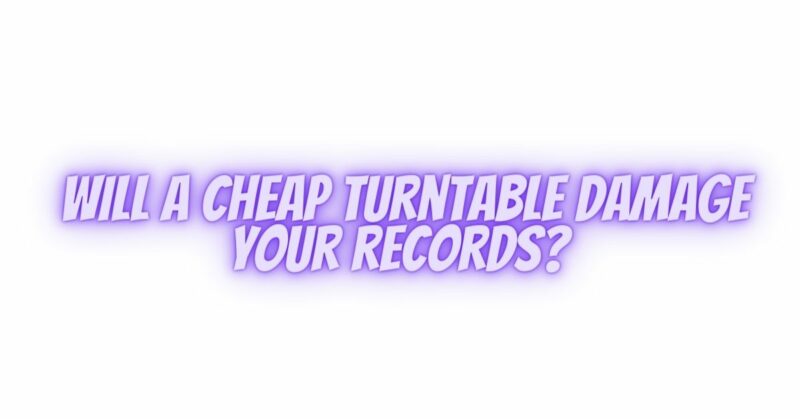The question of whether a cheap turntable can damage your precious vinyl records is a valid concern for anyone entering the world of vinyl playback on a budget. While inexpensive turntables have improved in quality over the years, it’s essential to understand the potential risks and take measures to minimize any adverse effects on your records. Here’s what you need to know:
1. Tracking Force and Stylus Quality:
Risk: Cheap turntables often come with low-quality tonearms and styluses that may not apply the correct tracking force (the pressure the stylus exerts on the record) or offer adjustable settings.
Impact: Excessive tracking force can lead to accelerated record wear and groove damage. If the stylus is not properly aligned or is of poor quality, it can skip or jump, causing further harm.
Mitigation: If you have a cheap turntable, ensure the tracking force is within the manufacturer’s recommended range. Some entry-level turntables may have non-adjustable tonearms, so choose one with the best reputation for gentle tracking. Consider upgrading the stylus to a higher-quality option if possible.
2. Speed Accuracy:
Risk: Inexpensive turntables may not maintain accurate rotational speeds (33 1/3 and 45 RPM) due to subpar motors and belt systems.
Impact: Speed inconsistencies can affect pitch and audio quality, especially for music enthusiasts with a discerning ear.
Mitigation: Regularly check and calibrate your turntable’s speed to minimize pitch variations. If speed accuracy is a significant concern, investing in a turntable with a stable motor and accurate speed control may be worthwhile.
3. Tonearm Quality:
Risk: Cheap turntables may have poorly constructed tonearms with inadequate bearings and anti-skate mechanisms.
Impact: A substandard tonearm can cause excessive friction, leading to groove wear and distortion, as well as difficulties in properly balancing the tonearm.
Mitigation: Look for turntables that have tonearms with decent build quality and features like adjustable counterweights and anti-skate controls. Properly setting up the tonearm according to the manufacturer’s instructions is crucial.
4. Platter Material:
Risk: Inexpensive turntables may feature lightweight or plastic platters that lack the necessary mass for stable rotation.
Impact: A lightweight platter can lead to speed fluctuations and may not provide sufficient damping, affecting audio quality.
Mitigation: Consider upgrading to a turntable with a heavier platter or using additional damping accessories to stabilize the platter’s rotation.
5. Build Quality:
Risk: Cheap turntables often compromise on build quality, using lightweight materials and subpar components.
Impact: Poor build quality can result in vibrations and resonance that negatively impact sound quality and tracking stability.
Mitigation: If you own a budget turntable, place it on a stable surface to minimize vibrations. Isolation accessories, such as turntable mats and isolation feet, can help mitigate resonance issues.
Conclusion:
While it’s true that cheap turntables can pose some risks to your vinyl records, the extent of potential damage largely depends on the specific model and how well you maintain and use it. With careful setup, regular maintenance, and awareness of the turntable’s limitations, you can enjoy your vinyl collection without significant harm to your records.
If your budget allows, investing in a higher-quality turntable with better components and build quality is generally a safer bet for preserving your vinyl records in the long run. However, if you’re starting with a cheap turntable, take the time to learn how to set it up correctly and consider future upgrades to enhance both your listening experience and the longevity of your records.


